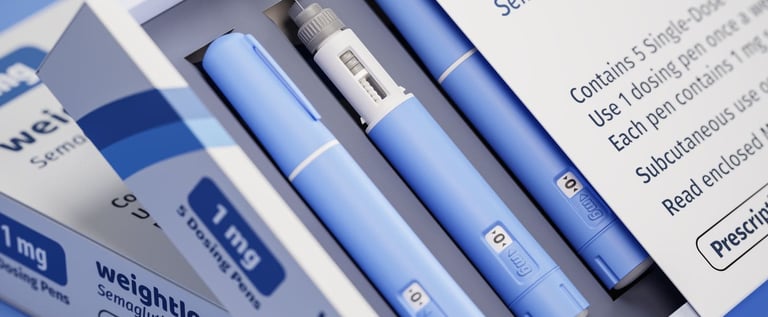The Surge of GLP-1 Medications: A Game-Changer in Weight Loss and Diabetes Management
Explore the rise of GLP-1 medications like Ozempic and Wegovy, their effectiveness in weight loss and diabetes management, and the implications for healthcare in the U.S.
HEALTH
8/17/20253 min read
In recent years, GLP-1 medications have transitioned from being primarily prescribed for type 2 diabetes to becoming a cornerstone in weight loss treatments. Drugs such as Ozempic, Wegovy, and Mounjaro are now at the forefront of discussions about obesity management and metabolic health. This article delves into the reasons behind their popularity, their effectiveness, and the broader implications for healthcare in the United States.
What Are GLP-1 Medications?
Glucagon-Like Peptide-1 (GLP-1) is a hormone naturally produced in the gut that plays a crucial role in regulating blood sugar levels, appetite, and insulin secretion. GLP-1 receptor agonists mimic this hormone, leading to enhanced insulin release, reduced glucagon secretion, delayed gastric emptying, and increased satiety. These effects contribute to improved blood sugar control and weight loss.
The most commonly prescribed GLP-1 medications include:
Ozempic (semaglutide): Initially approved for type 2 diabetes, it has gained attention for its weight loss benefits.
Wegovy (semaglutide): A higher-dose version of Ozempic specifically approved for chronic weight management.
Mounjaro (tirzepatide): Targets both GLP-1 and GIP receptors, showing significant weight loss results.
Rybelsus (oral semaglutide): The first oral GLP-1 medication for type 2 diabetes.
The Rise in Popularity
The adoption of GLP-1 medications has seen a remarkable increase in recent years. According to a RAND report, nearly 12% of Americans have used GLP-1 drugs for weight loss, with about one-fifth of women aged 50 to 64 among the users. This surge is attributed to several factors:
Efficacy in Weight Loss: Clinical studies have demonstrated that GLP-1 medications can lead to significant weight loss. For instance, patients using Wegovy have experienced an average weight loss of approximately 12%, while those on Mounjaro have seen up to 18% weight reduction.
FDA Approvals: The approval of Wegovy for weight loss and Mounjaro for both diabetes and weight loss has expanded the accessibility of these treatments.
Celebrity Endorsements and Media Attention: High-profile endorsements and media coverage have brought GLP-1 medications into the public spotlight, increasing demand.
Social Media Influence: Platforms like TikTok and Instagram have amplified discussions about these medications, with users sharing personal success stories and experiences.
Effectiveness and Side Effects
GLP-1 medications have proven effective in both managing blood sugar levels and promoting weight loss. However, their use is not without potential side effects. Common side effects include:
Gastrointestinal Issues: Nausea, vomiting, and diarrhea are frequently reported, especially during the initial stages of treatment.
Risk of Thyroid Tumors: Animal studies have indicated a potential risk of thyroid tumors, though this has not been conclusively proven in humans.
Pancreatitis: There have been concerns about an increased risk of pancreatitis, though evidence is limited.
It's essential for individuals considering GLP-1 medications to consult with healthcare providers to weigh the benefits against potential risks.
To learn more about effectiveness and side effects of GLP-1 medication check out Effectiveness and Side Effects of GLP-1 Medications: What You Need to Know
Accessibility and Cost
Despite their effectiveness, GLP-1 medications can be expensive. The cost can range from $800 to $1,200 per month without insurance coverage. However, many pharmaceutical companies offer patient assistance programs to help offset costs. Additionally, some insurance plans are beginning to cover these medications, especially for patients with type 2 diabetes or obesity.
The high demand and cost have led to shortages in some areas, making it challenging for patients to access these treatments promptly.
Ethical Considerations and Misuse
The surge in popularity of GLP-1 medications has raised ethical questions, particularly regarding their use for weight loss in individuals without obesity. Some critics argue that the widespread use of these drugs for cosmetic purposes may contribute to societal pressures and unrealistic body image standards.
Moreover, there have been reports of misuse, with individuals obtaining prescriptions without medical supervision. This underscores the importance of regulated access and responsible use of these medications.
Future Outlook
The future of GLP-1 medications appears promising, with ongoing research exploring their potential benefits in other areas, such as cardiovascular health and neurodegenerative diseases. Additionally, the development of oral formulations may increase accessibility and convenience for patients.
As the healthcare landscape continues to evolve, GLP-1 medications are likely to play a significant role in the management of obesity and type 2 diabetes, provided that their use is guided by medical expertise and ethical considerations.
Conclusion
GLP-1 medications have revolutionized the treatment of obesity and type 2 diabetes, offering effective solutions for weight management and metabolic health. While their rise in popularity is commendable, it is crucial to approach their use with informed decision-making and medical guidance. As research progresses, these medications may become integral components of comprehensive healthcare strategies aimed at improving public health outcomes.


